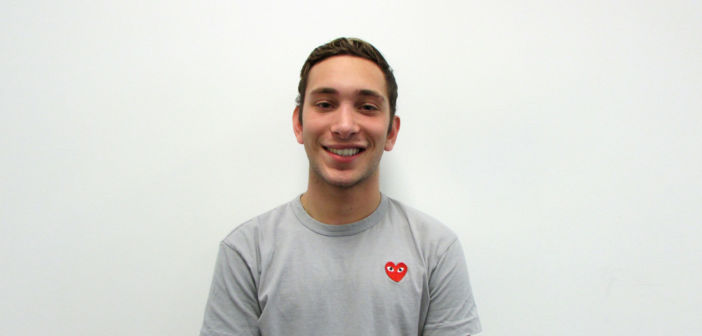Harry Zuckerman, ’21, recalls a photograph of himself at six months old — the last picture of him without his scar.
Now, 19-year-old Zuckerman’s chest scar illustrates the aftermath of the three open-heart surgeries he needed because of the congenital heart disease, Tetralogy of Fallot.
“It’s a part of me,” Zuckerman said. “It tells a story.”
The scar tells stories beyond the surgeries. Zuckerman said when he went to camp as a child, he was “the kid that always wore a swim shirt.” He didn’t want the questions. He barely knew how to explain them himself.
He was told he had a “boo-boo” that the doctors could fix. His first life-saving surgery was at six months old. Six years later he would have his second.
Although Zuckerman’s memories from his second surgery at six years old are somewhat vague, the memory of his best friend Kyle Pearlman visiting him in the hospital has stuck with him.
Pearlman said his young self knew about his friend’s scar and surgery, and it did not faze him or change their friendship. He remembers wheeling Zuckerman around the hospital, looking at the murals that filled the walls. In those moments, they were just friends playing.
At six years old, Zuckerman said this made him happy. Now, the word he uses is grateful. This seemingly simple act is what Zuckerman said helped him heal most.
“When someone sick is going through a hard time… the best medicine is a friend…the people that are there for you and will always be there for you,” he said.
Seven years later, this experience would inspire Zuckerman to write a book.
When Zuckerman was 13 years old, he had to select a project for his Bar Mitzvah, to give back to the community in some way.
Zuckerman said he has always been someone that tries to do something different. He wanted a project that would stick with him for the rest of his life and would help people. He said his main goal was to help people.
His mother encouraged him to tell his story, but Zuckerman decided to instead tell the story that had the greatest impact on him—the story of him and his best friend.
The children’s book is written as a conversation between Zuckerman and Pearlman, portraying their thoughts and interactions around Zuckerman’s time in the hospital. The book — “Friends Help Hearts Heal” — is about the power of friendship.
“Although it’s written for children…the message goes far beyond that,” Zuckerman said.
The two friends wrote the storyline in less than an hour. They crafted the book in the weeks that followed, seeking the help of their art teacher for illustrations and Zuckerman’s grandfather, who is an author, to bring it to publishers.
The following months would bring Zuckerman and Pearlman to hospitals and elementary schools. Their mission was to share the power and presence of friendship during difficult times with children who have all sorts of health conditions.
“That was just as important as reading to the kids who were ill and in the hospital, because without both sides knowing what the other side was going through, then how are you going to create any change?” Zuckerman said. “Friends need to be there for you even if they’re not going through the same thing.”
Zuckerman said he likes everything in his life to come full circle. The book’s profits exceeded $15,000, but he donated half to the hospital where he had his surgeries and gave the remaining half to Pearlman’s cousin, who experienced health complications after a premature birth.
The boys’ story was featured in their local newspaper and they were also honored at Columbia University’s Babies Heart Fund Gala.
The story has a strong message and is testament to Zuckerman and Pearlman’s life-long friendship.
Pearlman, who has been good friends with Zuckerman since they were both in kindergarten, said Zuckerman is warm, outgoing and “so kind.”
“(Zuckerman) can make friends with just about anyone,” Pearlman said. “People take onto him very quickly.”
Jamie Palatnek, the mother of a 4-year-old with the same congenital heart disease as Zuckerman, can affirm that people take to Zuckerman quickly. Her son, Cooper, immediately liked Zuckerman and the two developed an incredible friendship.
Zuckerman was at his temple when he saw a flyer for “Super Hearts Walk.” He knew it was likely a cardiac organization and called the number. Jamie Palatnek answered the call — her family had just moved to Zuckerman’s area and was organizing the charity walk. When Zuckerman found out about Cooper, he said knew he had to meet him.
“He came running down the stairs and said, ‘you’re the boy who has the same thing on your chest as I do!’” Zuckerman said, becoming emotional. “I saw myself in him.”
Palatnek said although she has met many other children around Cooper’s age with the same heart condition, meeting someone Zuckerman’s age was “a huge moment.”
“I had never really got to see the face of someone who survived it,” Palatnek said. “When he walked in, I had a huge sigh of relief. He was a normal kid standing at my door…in high school…he had this whole life. It gave me some reassurance that Cooper was going to grow up and he was going to be fine.”
To Cooper, Zuckerman was the cool high schooler who had the same scar as him, Palatnek said. Now, as an eight-year old, “he sees (Zuckerman) like a glimpse into his own future.”
Their relationship grew at camp. For a few summers, Zuckerman returned to the camp he attended growing up as a counselor, while Cooper simultaneously attended as a camper.
As summers passed, Palatnek said Cooper was still wearing his swim shirt. She said although she always taught Cooper to be proud of the scar that makes him who he is and makes him brave, “kids get older and they can get mean.” Cooper felt embarrassed.
Zuckerman said his goal for that summer was to get Cooper to take off the swim shirt. He understood what Cooper was feeling better than anyone else could.
Palatnek said despite having “all the conversations in the world” with her son about his scar, all it took was encouragement from Zuckerman.
During the last week of camp, Cooper came up to Zuckerman without his swim shirt and told him he wasn’t wearing a shirt in the pool anymore because of him.
“I did my job,” Zuckerman said. “That’s why I put in the work and the time that I do, for that moment.”
With every situation life throws at Zuckerman, his positive mindset and full-circle mantra have prevailed. After his first year of college, Zuckerman made the decision to transfer to Lehigh from a school he loved to be closer to home for his third surgery.
“Everything happens for a reason,” Zuckerman said. “I was meant to be at Lehigh, regardless (of) if that’s what I thought two years ago. I like to have a plan and know what is going to happen. What all of this teaches you is that you’ve got to go with what life throws at you.”
He is now applying to become a transfer student orientation leader.
Zuckerman said he does not want sympathy or special treatment.
“I tell my story so people can learn from it — not so they can feel bad for me,” he said.
Palatnek said along with Zuckerman, the book made a huge impact on her family. She read the story to Cooper and said it helped him not only understand what he went through, but as he was starting school, it taught him to be there for his new friends who were going through hard times which may be different from his own.
Zuckerman said to his core, he wants to help people, hoping that sharing his story can inspire others who may be struggling with their own health journey and inspire friends to be there for them.
The book is available for purchase on Amazon.






Comment policy
Comments posted to The Brown and White website are reviewed by a moderator before being approved. Incendiary speech or harassing language, including comments targeted at individuals, may be deemed unacceptable and not published. Spam and other soliciting will also be declined.
The Brown and White also reserves the right to not publish entirely anonymous comments.
1 Comment
Peer pressure for good, I love it.